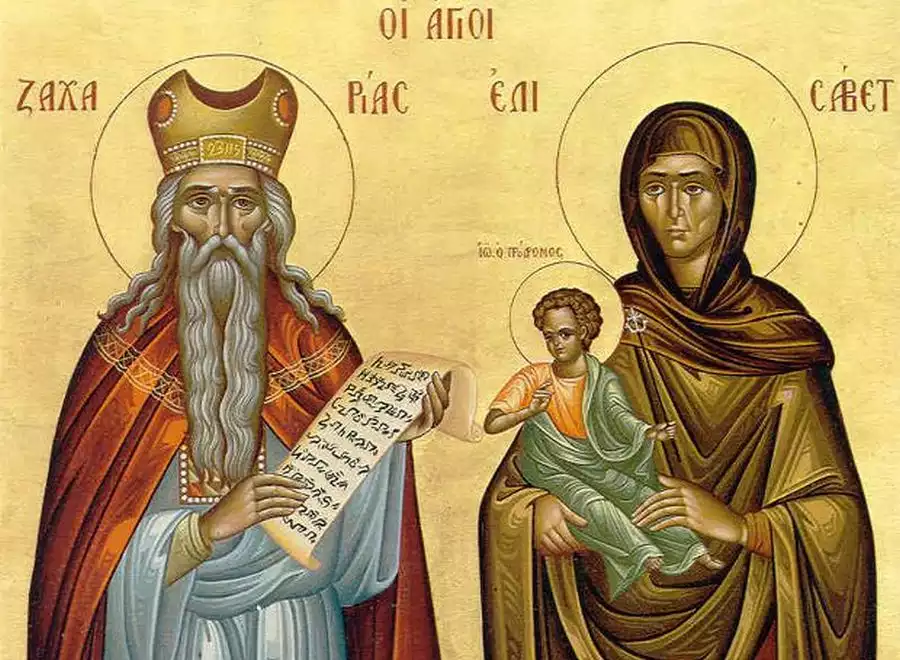
The priest Zacharias and his wife Elizabeth were righteous people who longed for a child in their old age. One day while Zechariah was serving in the temple, the angel Gabriel appeared to him to proclaim the miraculous – Elizabeth would finally conceive a son in her barrenness. But Zacharias questioned Gabriel’s tidings out of disbelief. For his doubt, the angel rendered him mute until the prophecy was fulfilled. True to the angel’s word, Elizabeth did conceive. The child she bore would grow up to be John the Baptist – the desert-dwelling prophet who boldly prepared the way for Jesus Christ, the long-awaited Messiah.
A Righteous Priest and His Barren Wife
Zacharias and his wife Elizabeth upheld God’s commandments and ordinances blamelessly, but the couple faced a societal stigma in their old age – Elizabeth was barren. In a culture that equated virtue with fertility, Zacharias and Elizabeth’s childlessness was seen as a defect, even though Scripture states they were righteous in God’s sight.
As a priest of the division of Abijah, the time came for Zacharias to serve before God in the temple at Jerusalem. He was chosen by lot to enter the Holy Place and burn incense while the congregated worshipers prayed outside. The drifting incense created an aura of mystery within the Holy Place.
Sudden Vision Upsets the Priest’s Ritual
As Zacharias ministered alone behind the veil, the unexpected occurred – an angel materialized by the altar of incense! Zacharias was terrified at the heavenly being’s appearance. But the angel proclaimed: “Do not be afraid, Zacharias, for your prayer has been heard. Your wife Elizabeth will bear you a son, and you shall call his name John.”
Stunned, Zacharias questioned: “How can I know this for certain? For I am an old man, and my wife is advanced in years.” He failed to grasp the magnitude of this prophetic moment.
Angelic Messenger Reveals Divine Plan
In response to Zacharias’ doubt, the angel Gabriel identified himself by name and declared the priest would be mute, unable to speak until the day John was born. Why? Because Zacharias did not trust Gabriel’s message, which would “be fulfilled in their proper time.”
Gabriel revealed that John would be great in God’s sight – filled with the Holy Spirit even within Elizabeth’s womb. The couple’s son would be the prophesied forerunner who would proclaim the arriving Messiah with Elijah’s boldness and spirit. Gabriel concluded with a reaffirmation: “I was sent by the Lord to bring you this good news.”
A Metaphorical Sign Comes to Pass
When Zacharias’ week of temple service ended, he left speechless. The mute priest relied on hand motions to pronounce a blessing over the people, who perceived he had seen a vision. After his stint, Zacharias returned home. Sure enough, Elizabeth conceived and entered seclusion for five months.
“How the Lord has removed my disgrace!” she exclaimed. Just as Gabriel declared, God showed Elizabeth favor in her barren state at an advanced age. She would deliver the messenger who proclaimed Jesus’ debut onto the world stage.
The drama was set. Herod the Great ruled Judea as a Roman client king, while Caesar Augustus sat upon the imperial throne. And a deaf-mute priest named Zacharias foreshadowed the first cries of his promised son – John the Baptist.
An Age-Old Legacy Continues
John the Baptist’s dramatic origins presaged his pivotal role in preparing the way for Christianity in the deserts of Judea. Though the Gospel he preached seems archaic today, John’s call to repentance echoes through the centuries. Perhaps we still have something to learn from the timeless figure who stepped forth onto history’s stage from Zacharias and Elizabeth’s unlikely story.
References
Britannica, T. Editors of Encyclopaedia (2020). Zacharias. Encyclopedia Britannica.
Josephus, F., & Whiston, W. (1987). The works of Josephus: Complete and unabridged. Hendrickson Publishers.
Ryken, L., Wilhoit, J., Longman, T., Duriez, C., Penney, D., & Reid, D. G. (1998). Dictionary of biblical imagery. InterVarsity Press.
